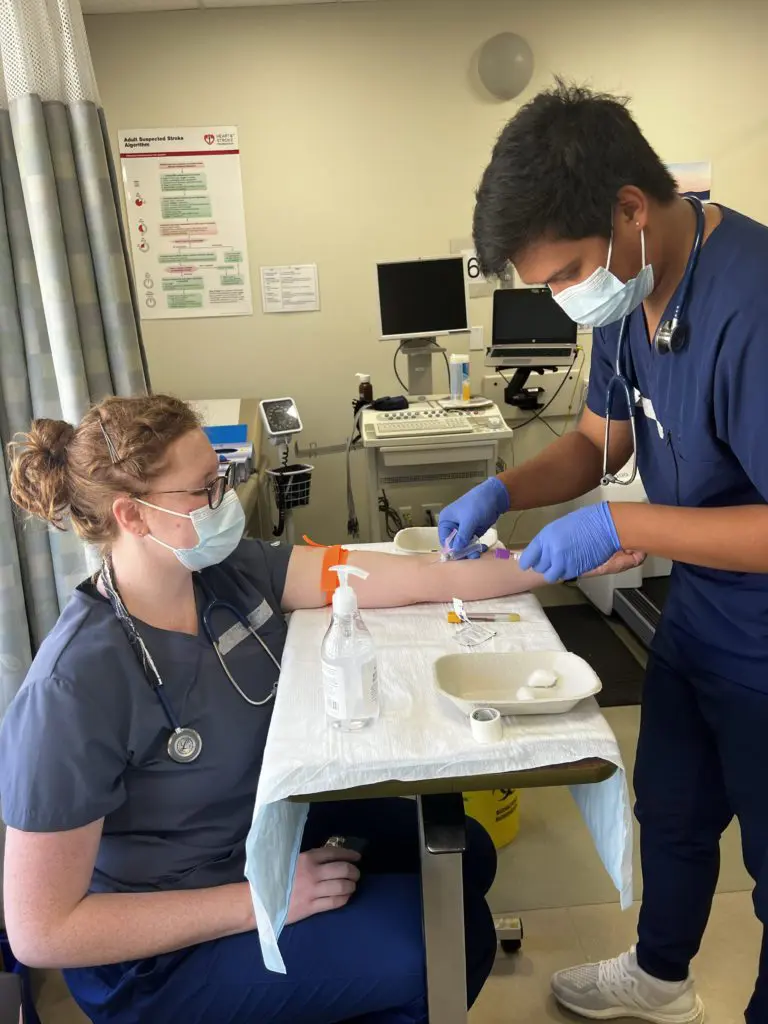Over the past two months, the Cardiology Technology class have been juggling two courses at once, Stress Testing and Holter Monitoring. Our time has been split up each day between the two, which consist primarily of lab work. The two separate courses involve skills that are very different from one another. I’d like to use this blog to talk about Stress Testing. Another name for this procedure is Exercise Tolerance Testing or ETT. It involves the patient walking on a treadmill while the Cardio Tech monitors their heart rate, blood pressure, ECG rhythms, and overall physical capabilities.
Exercise Tolerance Testing procedure
The procedure begins with the patient being hooked up with electrodes and leads, similar to that of a basic Electrocardiogram. A 12-lead ECG is printed along with a blood pressure reading while lying down, standing up, and throughout every stage on the treadmill. There are six stages in total and each patient has their own target heart rate to achieve based on their age. The treadmill accelerates and inclines a little more each stage.
This procedure requires a great deal of multitasking by the Cardio Tech. They have to constantly monitor both the patient, as well as the ECG monitor. If the Tech looks away from the screen and a cardiac abnormality appears but they miss it, there will be nothing to show the physician and the patient could be misdiagnosed. If the Tech solely focuses on the monitor, they could neglect to notice the patient struggling. Thankfully in the workplace there is a doctor present, but it’s still imperative to focus and practice attention to detail.
Another type of ETT
MIBI (Methoxyl IsoButyl Isonitrile) or MPI (Myocardial Perfusion Imaging) is another type of Stress Test that involves working with nuclear medicine. There are three different nuclear drugs used and they’re chosen based upon the patient’s pre-existing conditions. During an MPI procedure, a Nuclear Medicine Technologist works alongside the Cardiology Technologist to infuse the nuclear drugs which simulate exercise.
These procedures are designed for patients who are unable to use the treadmill. The patient remains lying down on the hospital bed and will do leg lifts or squeeze stress balls to help disperse the medication throughout their body. As with the standard Stress Test, the patient is monitored throughout the entire procedure.
Stress test course
In order to successfully pass the course, everyone had to complete a total of twenty stress tests and a practical exam. At first this seemed like a small amount, but it worked out well with having to complete 40 Holter scans in the same time frame.
Once again I invited my boyfriend along to be a guinea pig and it was a lot of fun. It allowed me to treat him as a real patient, following the same guidelines that I will be following in the workplace. Aside from my one guest, I completed the remainder of my stress tests with fellow classmates. It was a nice change of pace to start my school day with some exercise and to get a break from sitting at a desk all day.
I also really enjoyed how most of the past two months have been self-guided and our time was split between three instructors. We were given the freedom to dictate and organize our own schedules, as long as we completed both courses by the end of the second month. I used this opportunity to my advantage and worked hard to get ahead. I managed to finish all of my lab requirements two weeks early. Monday through Wednesday there were short lectures for review. Aside from that, it’s been a nice break to be done early and not have to worry about finishing everything on time. I also just received great news with regards to my practicum placement—I’m going to Kelowna! I’m really looking forward to going back to the Okanagan and beginning my new career at the Kelowna General Hospital.
Check out a video of our cardio tech students in action.






![An ECG demonstrates the extensive antero-septal-lateral myocardial infarction [heart attack] that Taryn witnessed.](https://stenbergcollege.com/wp-content/smush-webp/2022/12/ecg-1024x530.jpg.webp)



